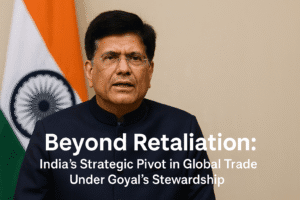Beyond Retaliation: India’s Strategic Pivot in Global Trade Under Goyal’s Stewardship
Commerce Minister Piyush Goyal declared India will actively “retaliate or rebalance” against any nation harming its export interests, directly addressing concerns over the UK’s planned 2027 carbon tax (CBAM). He argued CBAM’s true cost burden falls more heavily on European industries than Indian exporters, citing significant opposition within the EU itself.
While the newly signed India-UK trade pact (CEPA) deliberately excluded CBAM discussions as premature, Goyal emphasized India’s sovereignty and power to respond if future implementation undermines the deal’s benefits.
He contrasted this strategic agreement – which safeguards sensitive Indian sectors while offering developed market access – with past “unbalanced” deals like ASEAN, where India felt its market openness wasn’t reciprocated. Consequently, India now prioritizes FTAs with developed economies viewing it as a “complementary partner.” Goyal also confirmed significant progress in crucial trade talks with Oman (nearing finalization), the EU, and the US, signaling India’s assertive, confident new posture in global trade negotiations.

Beyond Retaliation: India’s Strategic Pivot in Global Trade Under Goyal’s Stewardship
Commerce Minister Piyush Goyal’s recent declaration wasn’t just a diplomatic warning shot; it was a crystallisation of India’s transformed posture in global trade. Speaking amidst concerns over the UK’s impending Carbon Border Adjustment Mechanism (CBAM), Goyal articulated a clear doctrine: “If anybody hurts India’s export interests, we will react, hurt and retaliate or rebalance.” This statement, far from mere bluster, underscores a calculated shift in how the world’s fifth-largest economy engages with international trade rules.
CBAM: The Looming Challenge & India’s Contrarian View
The UK’s CBAM, scheduled for January 2027, aims to tax carbon-intensive imports like steel and cement. While critics fear it could disadvantage developing economies, Goyal presented a counterintuitive perspective:
- The European Burden: He argued CBAM’s true cost won’t primarily fall on Indian exporters but will instead “increase the cost of infrastructure, housing, and manufacturing across the EU.” Highlighting significant opposition within Europe itself, Goyal positioned CBAM as potentially self-defeating for its architects.
- Sovereignty & Strategic Patience: Emphasizing India’s status as a “sovereign and very powerful nation,” Goyal clarified that the newly signed India-UK Comprehensive Economic Partnership Agreement (CEPA) deliberately sidestepped CBAM. His reasoning? “As of now, there is no CBAM. Even if it arises in some hypothetical future, it cannot be addressed through agreements being implemented today.” India reserves the right to respond proportionally if and when CBAM materially impacts gains secured under the FTA.
Learning from the Past: The ASEAN Lesson
Goyal contrasted the UK CEPA sharply with India’s past experience with the ASEAN Free Trade Agreement. He described ASEAN as yielding “little for India,” arguing partners “did not open their markets to us the way India did for their goods.” This perceived imbalance has fundamentally reshaped India’s FTA strategy:
- Targeting Complementary Partners: The Modi government is now laser-focused on deals with developed nations that view India “not as a competitor but as a complementary partner.” The UK CEPA exemplifies this, designed to “protect every sensitive sector of India” while offering significant new access to developed markets.
- Beyond Goods: A Holistic Approach: The UK deal signifies a move beyond simple tariff reductions, aiming for deeper integration in services, investment, and innovation – areas where India holds growing strengths.
The Broader Trade Canvas: Momentum Beyond London
Goyal confirmed significant progress on other key fronts:
- Oman: Negotiations are reportedly “almost finalised,” suggesting another strategic agreement in the Gulf region is imminent.
- European Union: Talks are described as making “fast progress,” indicating a potential major deal with one of the world’s largest economic blocs.
- United States: Despite complexities, discussions are also advancing rapidly, highlighting the breadth of India’s ambitious trade agenda.
The Goyal Doctrine: Assertiveness Rooted in Leverage
Goyal’s “retaliation” statement is more than rhetoric; it’s a reflection of India’s enhanced economic leverage and confidence. Key takeaways for the global trade landscape:
- Reciprocity is Non-Negotiable: India expects fair treatment and will actively counter measures it deems unfair, using all available trade policy tools.
- Developed Markets are the Priority: India is strategically pivoting towards FTAs that offer access to wealthy consumer bases and advanced technologies, moving beyond agreements with limited mutual benefit.
- Climate Policy Must Be Equitable: India will fiercely resist unilateral carbon measures like CBAM that it perceives as disguised protectionism or unfairly burdening developing economies. Its focus remains on domestic green initiatives aligned with its development needs.
- Trade is Geopolitical: These negotiations are not just about commerce; they are integral to India’s positioning as a leading global power demanding respect and equitable terms.
The Road Ahead: Vigilance and Opportunity
While the UK CEPA marks a milestone, vigilance regarding CBAM’s implementation is crucial. Goyal’s assertive stance serves notice that India will not passively accept trade barriers dressed as climate action. Simultaneously, the rapid progress with Oman, the EU, and the US signals a proactive and confident India, strategically weaving a new web of trade relationships designed to fuel its next phase of growth on terms it deems fair. The era of passive acceptance in global trade negotiations is decisively over for New Delhi.
You must be logged in to post a comment.